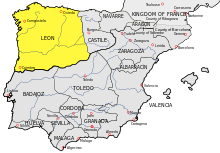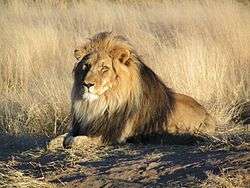Definify.com
Webster 1913 Edition
Leon
Le′on
Definition 2026
Leon
Leon
English
Proper noun
Leon
- A male given name, a Greek form of Leo, or Anglicized from the French Léon or Spanish León.
Anagrams
Breton
Pronunciation
- IPA(key): /ˈlewn/
Proper noun
Leon f
- Léon, a historical region of Brittany
Synonyms
- Bro-Leon
Derived terms
Faroese
Proper noun
Leon m
- A male given name
Usage notes
Patronymics
- son of Leon: Leonsson
- daughter of Leon: Leonsdóttir
Declension
| Singular | |
| Indefinite | |
| Nominative | Leon |
| Accusative | Leon |
| Dative | Leoni |
| Genitive | Leons |
Irish
Etymology
Proper noun
An Leon m (genitive Leoin)
Declension
First declension
|
Bare forms (no plural of this noun)
|
Forms with the definite article:
|
Old Portuguese

Pronunciation
- IPA(key): /le.ˈõ/
Etymology
From Latin Legione, ablative of Legio, Legionis, from Legio septima Gemina, a Roman legion.
Proper noun
Leon
- (Kingdom of) León
- 13th century, attributed to Alfonso X of Castile, Cantigas de Santa Maria, E codex, cantiga 332 (facsimile):
- ũu mõeſteiro en reino de Leon
- a monastery in the Kingdom of León
- ũu mõeſteiro en reino de Leon
- 13th century, attributed to Alfonso X of Castile, Cantigas de Santa Maria, E codex, cantiga 332 (facsimile):
- León (city)
- 13th century, attributed to Alfonso X of Castile, Cantigas de Santa Maria, E codex, cantiga 332 (facsimile):
- un mõeſteiro que este preto de Leon
- a monastery close to León
- un mõeſteiro que este preto de Leon
- 13th century, attributed to Alfonso X of Castile, Cantigas de Santa Maria, E codex, cantiga 332 (facsimile):
Descendants
Slovene
Pronunciation
- IPA(key): /ˈléːɔn/
- Tonal orthography: lẹ̑on
Proper noun
Léon m anim (genitive Léona)
- Leo; A male given name
Declension
leon
leon
Irish
Pronunciation
Etymology 1

From Old Irish léoman, léo, from Latin leō.
Alternative forms
- leomhan
Noun
leon m (genitive singular leoin, nominative plural leoin)
Declension
Etymology 2
From Old Irish leónaid, a late form of lénaid (“impairs, injures, wounds”), from lén (“defeat, hurt, injury, misfortune, sorrow”).
Verb
leon (present analytic leonann, future analytic leonfaidh, verbal noun leonadh, past participle leonta)
Conjugation
| singular | plural | relative | autonomous | ||||||
|---|---|---|---|---|---|---|---|---|---|
| first | second | third | first | second | third | ||||
| indicative | present | leonaim | leonann tú; leonair† |
leonann sé, sí | leonaimid | leonann sibh | leonann siad; leonaid† |
a leonann; a leonas / a leonann*; a leonas* |
leontar |
| past | leon mé; leonas | leon tú; leonais | leon sé, sí | leonamar; leon muid | leon sibh; leonabhair | leon siad; leonadar | a leon / ar leon* |
leonadh | |
| past habitual | leonainn | leontá | leonadh sé, sí | leonaimis; leonadh muid | leonadh sibh | leonaidís; leonadh siad | a leonadh / ar leonadh* |
leontaí | |
| future | leonfaidh mé; leonfad |
leonfaidh tú; leonfair† |
leonfaidh sé, sí | leonfaimid; leonfaidh muid |
leonfaidh sibh | leonfaidh siad; leonfaid† |
a leonfaidh; a leonfas / a leonfaidh*; a leonfas* |
leonfar | |
| conditional | leonfainn | leonfá | leonfadh sé, sí | leonfaimis; leonfadh muid | leonfadh sibh | leonfaidís; leonfadh siad | a leonfadh / ar leonfadh* |
leonfaí | |
| subjunctive | present | go leona mé; go leonad† |
go leona tú; go leonair† |
go leona sé, sí | go leonaimid; go leona muid |
go leona sibh | go leona siad; go leonaid† |
— | go leontar |
| past | dá leonainn | dá leontá | dá leonadh sé, sí | dá leonaimis; dá leonadh muid |
dá leonadh sibh | dá leonaidís; dá leonadh siad |
— | dá leontaí | |
| imperative | leonaim | leon | leonadh sé, sí | leonaimis | leonaigí; leonaidh† |
leonaidís | — | leontar | |
| verbal noun | leonadh | ||||||||
| past participle | leonta | ||||||||
* Indirect relative
† Dialect form
References
- "leon" in Foclóir Gaeilge-Béarla, An Gúm, 1977, by Niall Ó Dónaill.
- “lénaid” in Dictionary of the Irish Language, Royal Irish Academy, 1913–76.
- “léo” in Dictionary of the Irish Language, Royal Irish Academy, 1913–76.
Old English
Verb
lēon
Conjugation
| infinitive | lēon | tō lēonne |
|---|---|---|
| indicative | present | past |
| 1st-person singular | *līge | lāh |
| 2nd-person singular | *līhst | lige |
| 3rd-person singular | līhþ | lāh |
| plural | *lēoþ | ligon |
| subjunctive | present | past |
| singular | *līge | *lige |
| plural | *līgen | *ligen |
| imperative | ||
| singular | līh | |
| plural | *lēoþ | |
| participle | present | past |
| *lēonde | ligen | |
Old French
Noun
leon m (oblique plural leons, nominative singular leons, nominative plural leon)
- Alternative form of lion
- circa 1170, Christian of Troyes, Yvain ou le Chevalier au lion:
-
Et li leons, qui che esgarde,
De li aidier plus ne se tarde[.]- And the lion who was watching
Did not wait any longer to help him.
- And the lion who was watching
-
Et li leons, qui che esgarde,
-
Old Spanish
Etymology
From Latin leōnem, accusative of leō, from Ancient Greek λέων (léōn).
Pronunciation
- IPA(key): [leˈõn]
Noun
leon m (plural leones)
- lion
- c. 1250: Alfonso X, Lapidario, f. 6v.
- Et por ende a tal ṕpriedat eſta piedra q́ el q́ la trae obedecé le los leones aſſi q́ los puede tomar a manos ¬ nol fará mal por q́ el leó q́ndo la uee pierde toda la fuerça ¬ nó a en ſi poder.
- And such is the property of this stone that lions will obey he who bears it, so that he can touch them with his hands and they will not harm him, for when he sees it the lion loses all its strength and has in him no power.
- Et por ende a tal ṕpriedat eſta piedra q́ el q́ la trae obedecé le los leones aſſi q́ los puede tomar a manos ¬ nol fará mal por q́ el leó q́ndo la uee pierde toda la fuerça ¬ nó a en ſi poder.
- c. 1250: Alfonso X, Lapidario, f. 6v.
Related terms
Descendants
- Spanish: león
Venetian
Etymology
From Latin leō, leōnem (compare Italian leone).
Noun
leon m (plural leoni) or leon m (plural leuni)